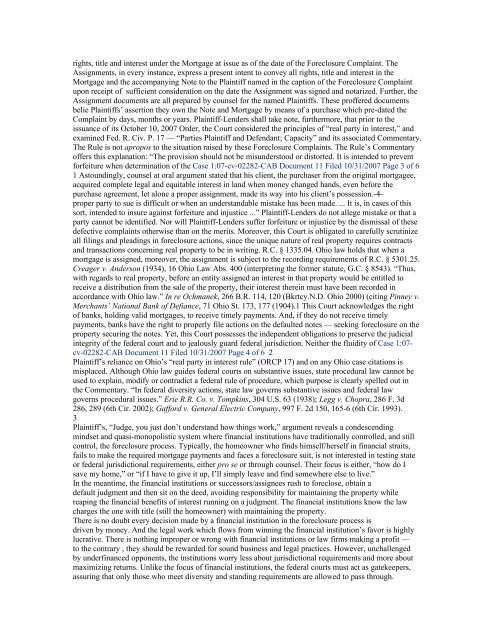Mortgage-KillerEX
Mortgage-KillerEX
Mortgage-KillerEX
You also want an ePaper? Increase the reach of your titles
YUMPU automatically turns print PDFs into web optimized ePapers that Google loves.
ights, title and interest under the <strong>Mortgage</strong> at issue as of the date of the Foreclosure Complaint. The<br />
Assignments, in every instance, express a present intent to convey all rights, title and interest in the<br />
<strong>Mortgage</strong> and the accompanying Note to the Plaintiff named in the caption of the Foreclosure Complaint<br />
upon receipt of sufficient consideration on the date the Assignment was signed and notarized. Further, the<br />
Assignment documents are all prepared by counsel for the named Plaintiffs. These proffered documents<br />
belie Plaintiffs’ assertion they own the Note and <strong>Mortgage</strong> by means of a purchase which pre-dated the<br />
Complaint by days, months or years. Plaintiff-Lenders shall take note, furthermore, that prior to the<br />
issuance of its October 10, 2007 Order, the Court considered the principles of “real party in interest,” and<br />
examined Fed. R. Civ. P. 17 — “Parties Plaintiff and Defendant; Capacity” and its associated Commentary.<br />
The Rule is not apropos to the situation raised by these Foreclosure Complaints. The Rule’s Commentary<br />
offers this explanation: “The provision should not be misunderstood or distorted. It is intended to prevent<br />
forfeiture when determination of the Case 1:07-cv-02282-CAB Document 11 Filed 10/31/2007 Page 3 of 6<br />
1 Astoundingly, counsel at oral argument stated that his client, the purchaser from the original mortgagee,<br />
acquired complete legal and equitable interest in land when money changed hands, even before the<br />
purchase agreement, let alone a proper assignment, made its way into his client’s possession.-4-<br />
proper party to sue is difficult or when an understandable mistake has been made. ... It is, in cases of this<br />
sort, intended to insure against forfeiture and injustice ...” Plaintiff-Lenders do not allege mistake or that a<br />
party cannot be identified. Nor will Plaintiff-Lenders suffer forfeiture or injustice by the dismissal of these<br />
defective complaints otherwise than on the merits. Moreover, this Court is obligated to carefully scrutinize<br />
all filings and pleadings in foreclosure actions, since the unique nature of real property requires contracts<br />
and transactions concerning real property to be in writing. R.C. § 1335.04. Ohio law holds that when a<br />
mortgage is assigned, moreover, the assignment is subject to the recording requirements of R.C. § 5301.25.<br />
Creager v. Anderson (1934), 16 Ohio Law Abs. 400 (interpreting the former statute, G.C. § 8543). “Thus,<br />
with regards to real property, before an entity assigned an interest in that property would be entitled to<br />
receive a distribution from the sale of the property, their interest therein must have been recorded in<br />
accordance with Ohio law.” In re Ochmanek, 266 B.R. 114, 120 (Bkrtcy.N.D. Ohio 2000) (citing Pinney v.<br />
Merchants’ National Bank of Defiance, 71 Ohio St. 173, 177 (1904).1 This Court acknowledges the right<br />
of banks, holding valid mortgages, to receive timely payments. And, if they do not receive timely<br />
payments, banks have the right to properly file actions on the defaulted notes — seeking foreclosure on the<br />
property securing the notes. Yet, this Court possesses the independent obligations to preserve the judicial<br />
integrity of the federal court and to jealously guard federal jurisdiction. Neither the fluidity of Case 1:07-<br />
cv-02282-CAB Document 11 Filed 10/31/2007 Page 4 of 6 2<br />
Plaintiff’s reliance on Ohio’s “real party in interest rule” (ORCP 17) and on any Ohio case citations is<br />
misplaced. Although Ohio law guides federal courts on substantive issues, state procedural law cannot be<br />
used to explain, modify or contradict a federal rule of procedure, which purpose is clearly spelled out in<br />
the Commentary. “In federal diversity actions, state law governs substantive issues and federal law<br />
governs procedural issues.” Erie R.R. Co. v. Tompkins, 304 U.S. 63 (1938); Legg v. Chopra, 286 F. 3d<br />
286, 289 (6th Cir. 2002); Gafford v. General Electric Company, 997 F. 2d 150, 165-6 (6th Cir. 1993).<br />
3<br />
Plaintiff’s, “Judge, you just don’t understand how things work,” argument reveals a condescending<br />
mindset and quasi-monopolistic system where financial institutions have traditionally controlled, and still<br />
control, the foreclosure process. Typically, the homeowner who finds himself/herself in financial straits,<br />
fails to make the required mortgage payments and faces a foreclosure suit, is not interested in testing state<br />
or federal jurisdictional requirements, either pro se or through counsel. Their focus is either, “how do I<br />
save my home,” or “if I have to give it up, I’ll simply leave and find somewhere else to live.”<br />
In the meantime, the financial institutions or successors/assignees rush to foreclose, obtain a<br />
default judgment and then sit on the deed, avoiding responsibility for maintaining the property while<br />
reaping the financial benefits of interest running on a judgment. The financial institutions know the law<br />
charges the one with title (still the homeowner) with maintaining the property.<br />
There is no doubt every decision made by a financial institution in the foreclosure process is<br />
driven by money. And the legal work which flows from winning the financial institution’s favor is highly<br />
lucrative. There is nothing improper or wrong with financial institutions or law firms making a profit —<br />
to the contrary , they should be rewarded for sound business and legal practices. However, unchallenged<br />
by underfinanced opponents, the institutions worry less about jurisdictional requirements and more about<br />
maximizing returns. Unlike the focus of financial institutions, the federal courts must act as gatekeepers,<br />
assuring that only those who meet diversity and standing requirements are allowed to pass through.












![[Pham_Sherisse]_Frommer's_Southeast_Asia(Book4You)](https://img.yumpu.com/38206466/1/166x260/pham-sherisse-frommers-southeast-asiabook4you.jpg?quality=85)




